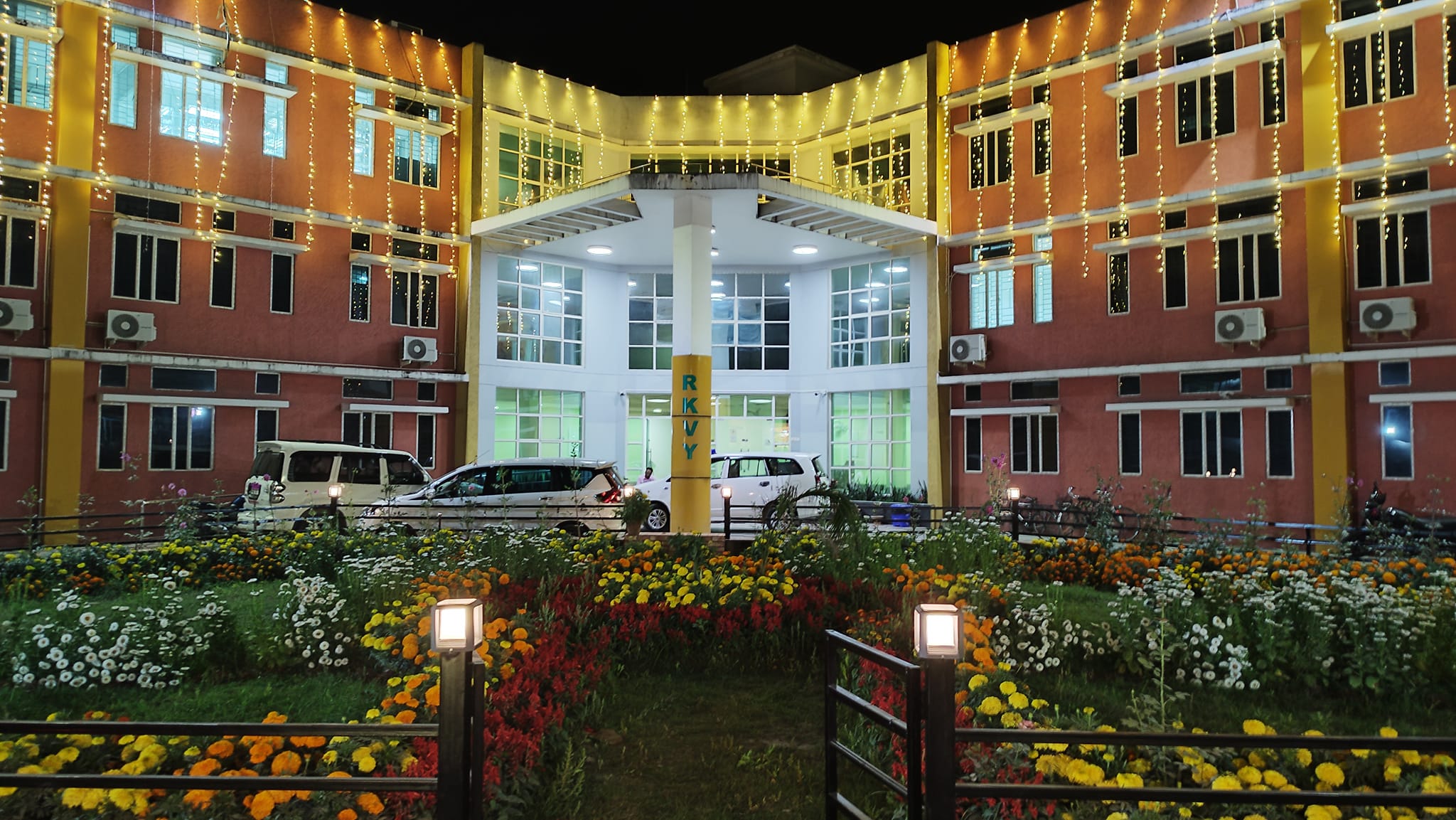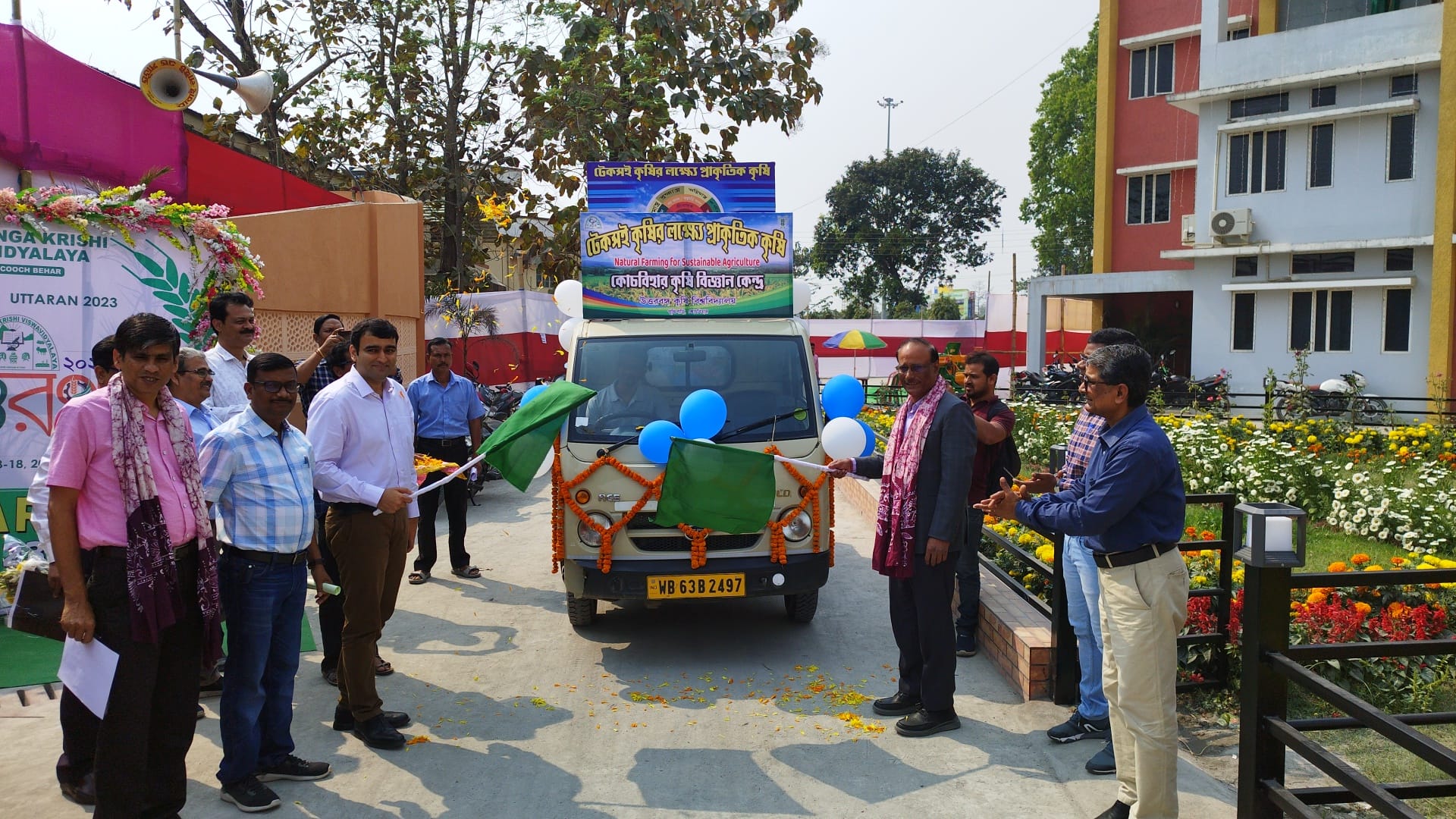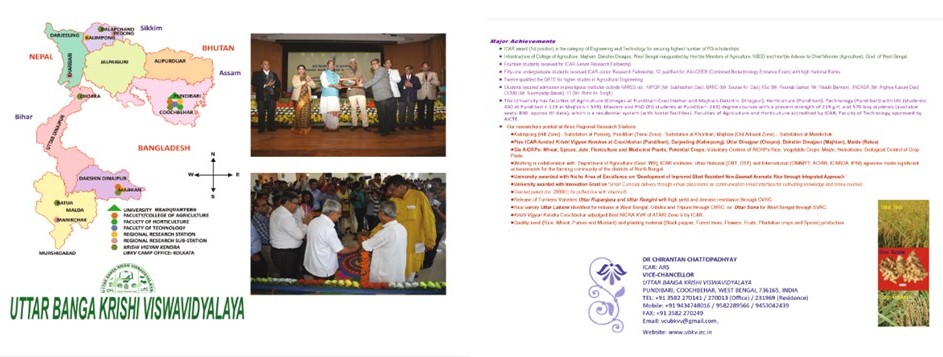PROGRAMME DRAWN CONSIDERING MODERNISATION :
In view of judicious utilization of farm infrastructures the University has been drawn a long term programme towards farmers’ service in perspective of the potentialities of the area and nature of constraints remaining thereof.
- Production of breeder/certified seeds of HYVs of major field crops to supply the seed villages.
- Production and distribution of quality planting materials of fruits, vegetables, ornamental, medicinal and aromatic plants having export potential under entrepreneurship development programme.
- Collection, characterization and conservation of plant genetic resources for crop improvement.
- Evaluation and mass production of indigenous biofertilizer strains for supply to the farmers at a low cost.
- Mass production of bio-control agents of pests and diseases of the crops, especially for those having export potential raised under organic production system.
- Development of models on INM, IPM, IWM situation based farming system in the University farms as demonstration units for the farmers.
- Introduction of different vocational and job-driven diploma/certificate courses for he educated farm-youth through rational utilization of available manpower and infrastructure as to be developed under RRS/RRSS/KVKs.
- Farmers’ training on participatory seed production.
SEED PRODUCTION PROGRAMME :
Seed is the most important input for harvest of good crop. The potential yields of crops depend on a quality of the seed used for cultivation. Use of quality seed alone can enhance the crop productivity by 15-25%. One of the main reasons of low productivity of crops is unavailability of reliable quality seeds in the local markets.
Among different field crops growing in North Bengal, rice, potato and jute can be considered as major ones. Other field crops, namely maize, wheat, mustard/rape, lathyrus and vegetable also cover considerably. Seed replacement rate in North Bengal is not up to the mark being only 27% for rice and 3% for potato. It indicates, that a sub-standard seeds are being used by the farmers. There is steep shortage of certified seeds of desirable crops as well as varieties. The cost of certified variety of crops is very high, particularly for potato (Rs. 30/- to Rs. 45/- per kg) and for jute (Rs. 80/- to Rs. 250/-). The traders enjoy the maximum profit out of the monopoly as well as scarcity of quality seed/seed materials. Therefore, it is urgent need to establish quality seed sources at least for major crops. Considering all aspects as discussed above the University has been taken initiative to utilize full potentialities of its farms strengthened and modernized with infrastructure and equipments to meet the farmers requirements at a possible extent. The achievement during the period of development is no doubt remarkable and it is expected that after full-fledged development more support can be extended to the farmers of North Bengal.
Production of Seeds of Field crops (in Quintal)
| Particulars | 2005-06 | 2006-07 | 2007-08 | 2008-09 | 2009-10 | Total |
|---|---|---|---|---|---|---|
| Breeder Seed |
– |
– |
– |
– |
20.71 |
20.71 |
| Foundation Seed |
– |
– |
137.65 |
26.28 |
346.69 |
510.62 |
| CS/TFL Seed |
513.75 |
998.62 |
1779.71 |
804.31 |
362.49 |
4458.88 |
| Participatory Seed Production |
– |
– |
539.00 |
717.50 |
448.60 |
1705.1 |
| Total |
513.75 |
998.62 |
2456.36 |
1548.09 |
1178.49 |
6695.31 |
CARP SPAWN PRODUCTION PROGRAMME :
Fishery, an important non-crop enterprise in North Bengal, has gained attention by the University. The University has also taken initiative towards production of carp spawn in its limited infrastructure facilities under the supervision of expert faculty.
Production of Carp Spawn (in lakhs)
| Particulars | 2005-06 | 2006-07 | 2007-08 | 2008-09 | 2009-10 | Total |
|---|---|---|---|---|---|---|
| Carp Spawn |
0.01 |
100 |
321 |
102 |
85 |
608.01 |
FARMERS PARTICIPAROTY SEED PRODUCTION :
The University has been possessing only 295 ha farm land, spreaded over the entire North Bengal. These farms have been primarily used for committed programmes of teaching, research and extension activities of the University. After satisfying the committed programmes, the farms have been utilizing for farmers’ service like production of quality seeds, planting materials and other means of production as well as advisory services.
However, the total farm land provided by the University is too meager to satisfy the requirement of farming community in North Bengal. Considering the demand for quality seeds of desirable varieties and supply thereto the University has been undertaken an alternative ways for production of quality seeds through adopting farmers’ participatory seed production programme in farmers’ field. This has been initiated as a pilot programme at different places of North Bengal and it is expected to be extended in large scale within few years. The programme envisaged:
- Organizing the farmers for production of quality seed through formation of Farmers’ Club/ SHG.
- Imparting training for farmers to develop skill in seed production, storage, marketing etc.
- Farmers’ participatory variety selection for improvement of productivity.
- Spread of HYVs through seed production in farmers’ field under direct supervision of scientists and technologist of the University.
- Establishing seed village at least for major crops.
- Providing storage, processing, testing, treatment an bagging facilities of farmers’ produced seed.
- Creating seed market to facilitate sale of seeds produced by the farmers as well as marketing availability of quality seed to the farmers who could not available the programme.
Upon spread of the programme all through North Bengal it definitely resulted:
- Elevated seed replacement rate by the newly released varieties.
- Generation of rural employment for educated youth through seed production, processing and marketing.
Farmers’ Participatory Seed Production (in Quintal)
|
Name of Crop |
2005-06 |
2006-07 |
2007-08 |
2008-09 |
2009-10 |
Total |
| Paddy |
– |
– |
209.0 |
282.0 |
296.0 |
787.0 |
| Potato |
– |
– |
330.0 |
432.0 |
141.5 |
903.5 |
| Mustard |
– |
– |
– |
3.0 |
11.10 |
14.1 |
| Total |
– |
– |
539.0 |
717.0 |
448.6 |
1704.6 |
Details of Seed Production (in Quintals)
|
Name of Crop |
Variety |
2005-06 |
2006-07 |
2007-08 |
2008-09 |
2009-10 |
Total |
| Paddy | MTU 7029 (Swana Masuri), MTU-1001, Masuri, Saraju-52, IET-4094 (khitish), Lalat, IR-36, Annada, GS-1, GS-2, GS-3, Ranjit, Parijat, IET-5656, Basumati, Khandagiri, IET-4786, IET-18547, IET-15848, Hamsa |
333.50 |
590.13 |
1358.17 |
666.72 |
587.51 |
3536.03 |
| Wheat | UP-262, NW-1012, MACS-6145, K307, HUW-468, RR-21 |
105.08 |
224.15 |
37.80 |
48.53 |
88.82 |
504.38 |
| Maize | Adequaba |
– |
– |
10.00 |
11.00 |
– |
21.00 |
| Old Seeds |
|
36.15 |
128.40 |
53.02 |
39.84 |
33.64 |
291.05 |
| Pulses |
|
19.17 |
30.62 |
21.72 |
4.50 |
1.43 |
77.44 |
| Others |
|
10.58 8.17 – – – – |
18.15 7.17 – – – – |
109.20 0.90 172.5 0.25 0.15 16.00 299.0 |
60.00 – – – – – 60.00 |
– |
403.07 |
|
Total |
512.65 |
998.62 |
1779.71 |
830.59 |
711.40 |
3365.77 |
|
PRODUCTION OF PLANTING MATERIALS FOR HORTICULTURAL CROPS:
Although, the University has been producing planting materials for horticultural crops at a low scale for expansion of area of its own farm and sale the surplus produces since long but from 2009-10 a pilot programme has been initiated towards large scale production for sale considering the local demand. However, due to want of adequate number of efficient mali for the purpose the programme could not be achieved towards desired success. The production of planting materials of horticultural crops in the University farms are as furnished below:
Production of Planting materials of Horticulture Crops
| Crop | Variety | Quantity |
|---|---|---|
| Elephant Foot Yam, Termeric etc. | Kavoor |
4123 quintals |
| Tube Rose | Calcutta, Double |
10 quintals |
| Guava rooted layers | improved variety |
800 nos. |
| Citrus | Elachi, lime |
2000 nos. |
| Litchi | Bedana | |
| Mango |
50 nos. |
|
| Pineapple | Suckers |
10000 nos. |
| Aricanut | Mohitnagar |
20000 nos. |
| Forest Plant | Fourteen spp. |
10000 nos. |
TRAINING ON SEED PRODUCTION :
University organized several on-station/ on-farm training programmes to the farmers for skill development in seed production of various crops. The programme has been started in 2008-09 on 12 areas only. Details of the training programme are furnished below:
Seed Production Training for Farmers and Field Staff (2008-09)
| Sl. No. | Topic of Training | No. of Courses | Duration | Trainee |
|---|---|---|---|---|
| 1. | Productivity enhancement in turmeric through varietal replacement |
1 |
1 |
10 |
| 2. | Quality Seed Production in elephant foot yam (Phase-I) |
1 |
1 |
18 |
| 3. | Quality Seed Production in elephant foot yam (Phase-II) |
1 |
1 |
16 |
| 4. | Certified Seed Production in rice (Phase-I) |
1 |
1 |
31 |
| 5. | Certified Seed Production in rice (Phase-II) |
1 |
1 |
16 |
| 6. | Quality Seed Potato of Production |
1 |
2 |
94 |
| 7. | Farmers’ Participatory Seed Production of rice |
5 |
1 |
253 |
| 8. | Farmers’ Participatory Seed Production of mustard |
3 |
1 |
153 |
| 9. | Farmers’ Participatory Seed Production of maize |
1 |
1 |
50 |
| 10. | Farmers Participatory Seed Production of pulses (black gram and green gram) |
1 |
1 |
50 |
| 11. | Farmers Participatory Seed Production of buck wheat |
1 |
1 |
52 |
| 12. | Training on rice seed production |
1 |
1 |
48 |
SEED-TESTING FACILITIES :
The University from ICAR sponsored Mega Seed Project fund developed a seed testing laboratory fully equipped with all equipments and facilties for testing seeds from internal as well as external sources also in order to protect the farmers’ interest through ensuring quality of seed. In addition to development of laboratory university has also developed training facilities for the farmers as well as for the Govt. officials to impart training on production of quality seeds, storage, testing as well as on inspection and other matters and policies relating to seed production, protection, quality, marketing and trade.


















